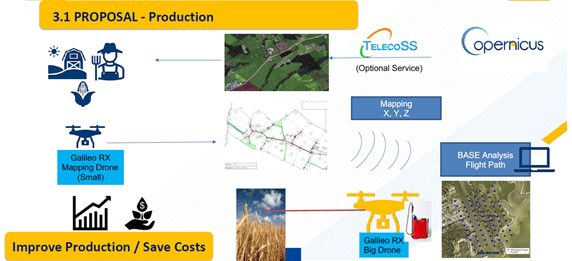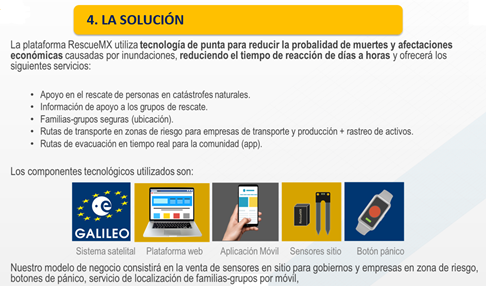


The first Hackathon organized jointly by the Galileo Information Canter for Chile (Argentina, Bolivia, Chile, Colombia, Ecuador) and the Galileo Information Canter for Mexico (Mexico, Central America and the Caribbean) took place from 9 to 10 September in an online event format and aimed at promoting the development of new applications that use Europe’s Global Navigation Satellite System (GNSS): Galileo.
The hackathon had a total of 67 registrations and 10 participating teams, eight of which reached the final of the contest. A significant majority of participants came from Mexico (65%), 10% from Chile, the same percentage from Ecuador and Panama, and 3% came from Colombia and Spain.
Regarding the profile of the participants, 28% were students, followed by entrepreneurs (26%), researchers (23%), and companies (13%). By age, more than 40% were between 25 and 35 years old, and 25% under 25 years old.
Two webinars were held prior the Hackathon where several speakers from the different countries covered by these GICs explained how to use Galileo data, use cases, business development and financing, among other topics. Videos of these sessions are available on the GICs websites of both centres.
Participants had to choose between the three available challenges related to the following areas of action:
The jury was made up of 4 members representing the countries and regions in which both Centres operate. The hackathon had 5 collaborators and 6 technical and business mentors.
And now, without further ado, the three winning teams are:
1st Place: TelecoSS, from Panama.
The winning project made up of Andrea Abreu, Ángel Arcia and Mabony Sánchez, is a solution called “GASC: Galileo-assisted Supply Chain” that seeks to improve the productivity and sustainability of their country Panama, with the implementation of Galileo Satellite Navigation System receivers providing support to the Food Supply Chain in the areas of Production, Logistics and Consumption. Initially, it seeks to offer a service model, in which the producer does not have to invest in CAPEX, but rather can adhere to an OPEX model, with an initial training fee plus a monthly operation fee.


2nd Place: Caring for the Community, from Mexico.
The second prize-winning project made up of Abraham Ramírez, Yuriko Fernández, Salvador Agredano and David Zapata. The solution, called “RescueMX“, uses state-of-the-art technology to reduce the number of deaths and other effects caused by floods, offering the following services: Support in the rescue of people in natural disasters, supporting information for groups of rescue, safe families (location), real-time evacuation routes for the community (app) and transport routes in risk areas for transport and production companies. To this end, its business model will consist of the sale of on-site sensors for governments and companies, panic buttons and family-group location services by mobile.

3rd Place: Locyg Systems, from Mexico.
The third prize-winner made up of Aldair Rey, Mario Soto, Jesús Silvestre, Xochitl Sivestre and Martin Montoya, devised the “RTrack+” project. This solution consists of a multiplatform with a redundant and robust ecosystem, which would provide solutions for private and government logistics services, through the use of metadata from the Galileo satellite constellation to measure operating costs, traceability of merchandise and implement optimizations tailored to users. It is oriented to small and medium-sized companies, giving the possibility of providing transportation service to individuals, micro, even small land fleets.

The winning teams will have free access to technical support, mentoring and/or services of various kinds. Namely:
Congratulations to all the teams!
| Cookie | Duration | Description |
|---|---|---|
| cookielawinfo-checkbox-analytics | 11 months | This cookie is set by GDPR Cookie Consent plugin. The cookie is used to store the user consent for the cookies in the category "Analytics". |
| cookielawinfo-checkbox-functional | 11 months | The cookie is set by GDPR cookie consent to record the user consent for the cookies in the category "Functional". |
| cookielawinfo-checkbox-necessary | 11 months | This cookie is set by GDPR Cookie Consent plugin. The cookies is used to store the user consent for the cookies in the category "Necessary". |
| cookielawinfo-checkbox-others | 11 months | This cookie is set by GDPR Cookie Consent plugin. The cookie is used to store the user consent for the cookies in the category "Other. |
| cookielawinfo-checkbox-performance | 11 months | This cookie is set by GDPR Cookie Consent plugin. The cookie is used to store the user consent for the cookies in the category "Performance". |
| viewed_cookie_policy | 11 months | The cookie is set by the GDPR Cookie Consent plugin and is used to store whether or not user has consented to the use of cookies. It does not store any personal data. |